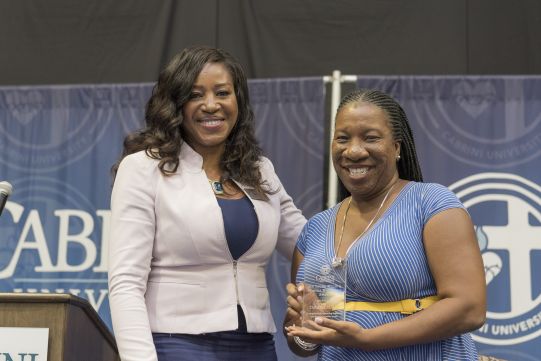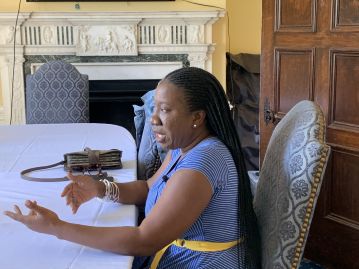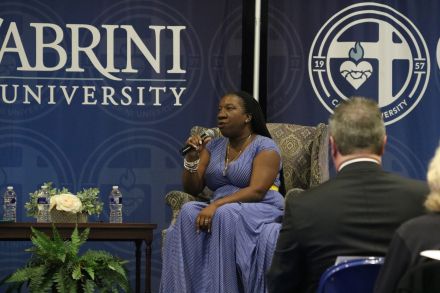Victims of sexual assault and rape are only obligated to heal. Just because you choose not to tell your story does not mean you lack courage. It is your story, your gift. This is the message a prominent spokesperson on sexual violence told an audience at Cabrini University.
“I’m a survivor of sexual violence, but I don’t let it define me,” Tarana Burke, founder of the ‘Me Too’ movement, said.
Each year the history and political science department recognizes a woman who has made notable contributions to improving the climate and conduct of public affairs and who has made a noteworthy impact in her community.
Because of her contributions to civil rights, this year Cabrini University awarded Burke The Ivy Young Willis and Martha Willis Dale Award.
This year Burke stood out to the committee members who make the decision. Her contributions to the civic life of her community are “head and shoulders above the rest,” Dr. Darryl Mace, chair of the department, said.

Burke captivated the audience with her stories and goals to stop marginalizing sexual violence. Everything the ‘Me Too’ movement stands for caters to the marginalized people first.
The ‘Me Too‘ movement helps survivors, particularly black women and girls and other young women of color from low wealth communities, find pathways to healing.
“We will not be able to serve everybody if we don’t start with the people in the margins,” Burke said.
Burke has been working for over a decade advocating for survivors. She has been working on providing resources and utilizing her platform to help survivors and educating people.
“Her theory of using empathy to empower survivors is changing the way the world thinks about and engages with survivors,” Provost Chioma Ugochukwu said before presenting Burke. “Her belief that healing isn’t a destination but a journey has touched and inspired millions of survivors who have previously lived with the pain, shame and trauma of their assaults in isolation.”
A movement, not a moment
In a separate interview, Burke discussed the importance of women being recognized for notable contributions in the area of social justice and public affairs.

“I think particularly awards that are about women making contributions are important because we don’t really highlight the contributions of women, particularly how we built this country and contributed to moving this country forward,” Burke said. “We don’t honor those things very often so I’m always honored to accept awards that speak to that and highlight that.”
With many people speculating that the ‘Me Too’ movement has lost its way after #MeToo blew up, she wanted to remind people of the roots of the movement.
“The movement hasn’t lost its way, it’s finding its legs. Our vision is starting to become clear,” Burke said.
“This is a movement that’s about healing and action. Even if you take my work, prior to the viral moment, off the table, this movement was never about taking anybody down, it was never calling people out. It was a movement for the people whose lives were affected by sexual violence to have a safe space. To say it, to stand up and be counted, to be seen, to be heard, and to find community.”
Burke also wanted to make it clear that the ‘Me Too’ movement isn’t a “women’s movement” but a survivor’s movement. Sexual violence affects all demographics. “Sexual violence does not discriminate.” She explained how no one is exempt from it. It is not dependent on race, where you live or your gender; sexual violence touches everyone.
Burke has been working on expanding her website.
“It’s a very robust website that speaks to the needs of survivors, those who want to support survivors and those who want to end sexual violence,” Burke said.
When discussing her thoughts to an audience of about 500 faculty and students, Burke talked about fixing and solving the problems of sexual violence.
She mentioned that there are many holes in the laws and policies concerning sexual violence.
“Laws and policies could help, but more than anything, a culture shift has to happen in order for people to feel safe to come forward,” Burke said. Burke made it clear that there’s no law preventing people from speaking up, from telling, from reporting but what people have seen is that they can do that and have no recourse.
“You can go and do all the things people tell you to do; you can report it to the police, have a rape kit done, file a report, go through an investigation and what do we have: a backlog in this country of thousands of rape kits that haven’t been tested; rape and sexual violence has the lowest conviction rate of all major crimes.”
For some people, speaking up, when they know that information and they know that everything that’s going to take for them to speak up, go through all of these hurdles, prevent them from doing that.
She led a powerful discussion addressing those who are survivors and those who want to support, accommodating to all the alternatives that could play a role in sexual violence, as promised. Audience members were inspired and touched by her words. Many sat in awe, others nodded in agreement and some were even brought to tears.
Burke shared her own story of being molested at just 6 years of age as well as the narrative of learning her daughter was sexually assaulted. She said it is important to look out for your children and ask those questions.
“My daughter is a survivor and I failed to get that information for five years,” Burke said. “Fear is not useful.”
Her final thoughts were to encourage survivors to heal. It’s easy to tell a victim to just “tell your story,” but living with it is hard enough.
“Your story doesn’t need to be public, doesn’t have to be validated by anyone…and if you can’t articulate your story, that doesn’t mean you lack courage. You survived a hard thing to survive. Getting up every day and living and breathing is courageous enough,” Burke said. “Your only obligation is to heal.”




